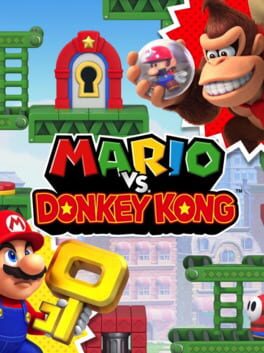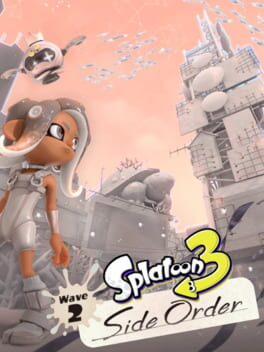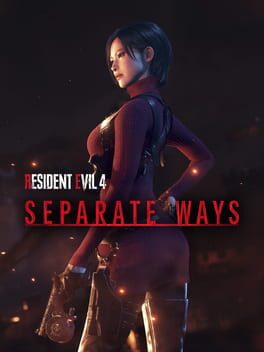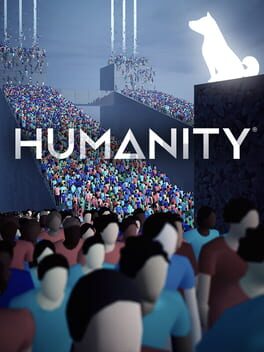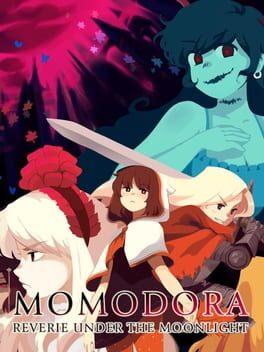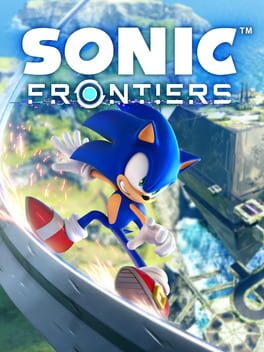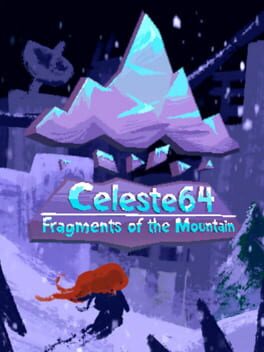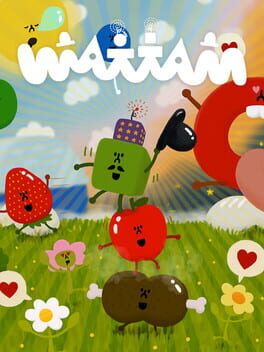surprisejunkie
it’s nice to see what the splatoon team can do when they aren’t rushed… feels very polished and well considered… unlike the main game…
maybe there is a slight lack of variation in content, but i suppose that’s the inherent tradeoff and it largely feels fresh regardless. this may well get iterated on in future…
maybe there is a slight lack of variation in content, but i suppose that’s the inherent tradeoff and it largely feels fresh regardless. this may well get iterated on in future…
2023
it could be tempting to say this is a “modern take on lemmings” and call it a day, but i don’t think that’s quite it. humanity is a game very clearly of that early, experimental lineage that defined playstation throughout its first decade. it is to games like intelligent qube, kula world, and nobody can stop mr. domino what shovel knight is to some of the most beloved 80s NES titles. just that alone feels special, a product of a bygone era that by all accounts should not exist in our current dogshit aaa-core milieu. but it is by the same token that this was, at least personally, a bittersweet experience. major players, and especially sony, have lost all interest in fostering this spirit, so we’re left to pick up whatever crumbs we can get. at least there are still a small few out there carrying that torch.
2022
sega has once again made the thing they know how to make: a strongly worded love letter to arcade-era game design. hard to care much about other strengths and weaknesses beyond how frontiers manages to inject something ever-so-slightly fresh into open world interactions. it made me wonder what a treasure-developed open world game could feel like, which is reward enough.
2023
so here we have a truly fascinating and versatile concept expressed through an over-polished and self-conscious game. within is an experience that is mostly engaging but ultimately feels shallow, especially for a game about layers upon layers of layers.
in one sense i suppose it is respectable that cocoon takes great pains to ensure players feel satisfied enough in the solutions they find while never needing/wanting to resort to a walkthrough. in another, it feels frictionless, like every rough edge has been sanded down out of fear that players will abandon it after being stuck on a puzzle for more than three minutes. there is most certainly a scent of cowardice in the air.
maybe this is an unfair assessment... maybe this is the whole point of the game.
cocoon is clever, meditative, and mysterious. like its priors it leads you along at a quick clip, providing the exact pieces you need to proceed at any given moment, if only you could arrange them correctly. usually it is not hard to do so. it communicates very clearly and efficiently while never stooping so low as to utter a word. on rare occasions it can be brilliant.
for each unique puzzle and new layer of complexity, though, the player remains railroaded. cocoon plays it very safe: there are no red herrings or misdirectives. nor is it cerebral in any sense that requires real experimentation or planning. upon entering a given area you will probably find yourself gated, stuck in a small space until you can solve for the one to three missing variables. sometimes, a solution is essentially forced upon you. it shares the DNA of a dungeon in link's awakening more than anything else, feeling more like a series of increasingly elaborate — but nonetheless entertaining — tricks designed to make you feel smart. this is not necessarily a criticism.
all of this is fine. it makes sense that this game follows limbo and inside, which similarly leaned into the "adventure" side of our silly genre classifications. but if you are taken by cocoon’s core concept, you may realise the game is not too concerned with plumbing the depths of its potential.
you will gather several orbs as you play. each contains its own world that you can carry around, enter, traverse, and jump out of at various junctures. eventually, you will learn that you can bring one orb into the world of another orb, with the implications of this made alarmingly clear from the first instance. each orb also adds its own related mechanic: one reveals paths to traverse, one involves teleportation, and so on. these are all fun on their own and especially in concert as the game progress and the order of operations expands, but it is only towards the latter half of the game that it really begins to deliver on its core conceit.
cocoon is most fascinating once the worlds-within-worlds concept is in full view. in a better-late-than-never moment, it starts to press on your spatial reasoning abilities. you will eventually find yourself trying to assemble a multiworld layer cake. some of the last few puzzles inspire genuine awe, in part because the leash has finally relaxed a little, leaving slightly more room to explore the possibilities. even if this is largely contrived (and it is), it is cocoon's best trick. but as soon as that other shoe drops, and you see the concept for everything it could be, all that's left to do is watch the game end.
it's not that much more is needed, or that it feels incomplete. this should not be stretched into a six, seven, eight-hour game. nor is it the approach to puzzles, restrictive as they may be. there is a clear motive here and it would probably be unfair of me to expect, for example, an exploitable black box (baba is you) or a sprawling logic puzzle (return of the obra dinn). given its lineage, cocoon was certainly always meant to be a meditative one-and-done audiovisual adventure, not something to be notated akin to a schizophrenic theory of everything. but for every intention it delivers on, it is sad to see it taketh just as soon as it giveth, leaving you to wonder what could have been had it taken a few small steps further.
for now, though, i just cannot shake the feeling that i have reached the end of the castle/spaceship/indeterminate transdimensional realm, ready to face the final boss, only to find no that no one is home.
in one sense i suppose it is respectable that cocoon takes great pains to ensure players feel satisfied enough in the solutions they find while never needing/wanting to resort to a walkthrough. in another, it feels frictionless, like every rough edge has been sanded down out of fear that players will abandon it after being stuck on a puzzle for more than three minutes. there is most certainly a scent of cowardice in the air.
maybe this is an unfair assessment... maybe this is the whole point of the game.
cocoon is clever, meditative, and mysterious. like its priors it leads you along at a quick clip, providing the exact pieces you need to proceed at any given moment, if only you could arrange them correctly. usually it is not hard to do so. it communicates very clearly and efficiently while never stooping so low as to utter a word. on rare occasions it can be brilliant.
for each unique puzzle and new layer of complexity, though, the player remains railroaded. cocoon plays it very safe: there are no red herrings or misdirectives. nor is it cerebral in any sense that requires real experimentation or planning. upon entering a given area you will probably find yourself gated, stuck in a small space until you can solve for the one to three missing variables. sometimes, a solution is essentially forced upon you. it shares the DNA of a dungeon in link's awakening more than anything else, feeling more like a series of increasingly elaborate — but nonetheless entertaining — tricks designed to make you feel smart. this is not necessarily a criticism.
all of this is fine. it makes sense that this game follows limbo and inside, which similarly leaned into the "adventure" side of our silly genre classifications. but if you are taken by cocoon’s core concept, you may realise the game is not too concerned with plumbing the depths of its potential.
you will gather several orbs as you play. each contains its own world that you can carry around, enter, traverse, and jump out of at various junctures. eventually, you will learn that you can bring one orb into the world of another orb, with the implications of this made alarmingly clear from the first instance. each orb also adds its own related mechanic: one reveals paths to traverse, one involves teleportation, and so on. these are all fun on their own and especially in concert as the game progress and the order of operations expands, but it is only towards the latter half of the game that it really begins to deliver on its core conceit.
cocoon is most fascinating once the worlds-within-worlds concept is in full view. in a better-late-than-never moment, it starts to press on your spatial reasoning abilities. you will eventually find yourself trying to assemble a multiworld layer cake. some of the last few puzzles inspire genuine awe, in part because the leash has finally relaxed a little, leaving slightly more room to explore the possibilities. even if this is largely contrived (and it is), it is cocoon's best trick. but as soon as that other shoe drops, and you see the concept for everything it could be, all that's left to do is watch the game end.
it's not that much more is needed, or that it feels incomplete. this should not be stretched into a six, seven, eight-hour game. nor is it the approach to puzzles, restrictive as they may be. there is a clear motive here and it would probably be unfair of me to expect, for example, an exploitable black box (baba is you) or a sprawling logic puzzle (return of the obra dinn). given its lineage, cocoon was certainly always meant to be a meditative one-and-done audiovisual adventure, not something to be notated akin to a schizophrenic theory of everything. but for every intention it delivers on, it is sad to see it taketh just as soon as it giveth, leaving you to wonder what could have been had it taken a few small steps further.
for now, though, i just cannot shake the feeling that i have reached the end of the castle/spaceship/indeterminate transdimensional realm, ready to face the final boss, only to find no that no one is home.
2022
2019
like katamari damacy and noby noby boy before it, wattam is foremost a vehicle for interaction.
well before super mario bros. existed, its makers learned the inherent fun of seeing your avatar react to the press of a button. they have since spent entire decades making games about how nothing could be more fun than pressing those buttons. keita takahashi has always pulled this trick: just as you don't jump in a mario game to avoid an obstacle — you do it simply because it is fun — every action in wattam is performed for the joy of doing something because you can.
if its priors sit at opposing ends of the playground vs. videogame spectrum (they don’t, btw), wattam fits closer to the middle. there is “game stuff” in here, sure, but it feels largely incidental. it is, broadly, a toy box wherein the smallest actions serve as their own reward. maybe you just wanna hold hands with your buddies or whatever. maybe you wanna eat the mayor. maybe you just want to poke and prod at some little dude to see what happens. who cares. do what you like. have fun. but by the time you are done, the totality of these actions will have filled the toy box beyond bursting point, and therein lies it’s greatest trick.
in most cases, the player will not feel as though they are consciously solving a puzzle or figuring out their next step. to engage with wattam in this way is to be a boring person with a boring attitude. but so long as one has maintained a brain unrotted by videogames and a heart not entirely sapped of whimsy, they will be constantly propelled through the force of their own curiosity.
well before super mario bros. existed, its makers learned the inherent fun of seeing your avatar react to the press of a button. they have since spent entire decades making games about how nothing could be more fun than pressing those buttons. keita takahashi has always pulled this trick: just as you don't jump in a mario game to avoid an obstacle — you do it simply because it is fun — every action in wattam is performed for the joy of doing something because you can.
if its priors sit at opposing ends of the playground vs. videogame spectrum (they don’t, btw), wattam fits closer to the middle. there is “game stuff” in here, sure, but it feels largely incidental. it is, broadly, a toy box wherein the smallest actions serve as their own reward. maybe you just wanna hold hands with your buddies or whatever. maybe you wanna eat the mayor. maybe you just want to poke and prod at some little dude to see what happens. who cares. do what you like. have fun. but by the time you are done, the totality of these actions will have filled the toy box beyond bursting point, and therein lies it’s greatest trick.
in most cases, the player will not feel as though they are consciously solving a puzzle or figuring out their next step. to engage with wattam in this way is to be a boring person with a boring attitude. but so long as one has maintained a brain unrotted by videogames and a heart not entirely sapped of whimsy, they will be constantly propelled through the force of their own curiosity.
2023
2019

